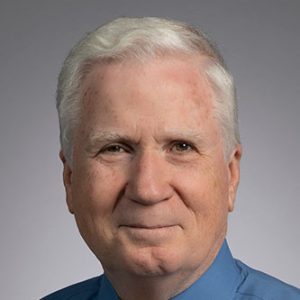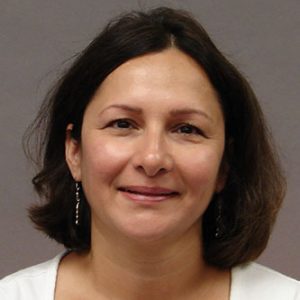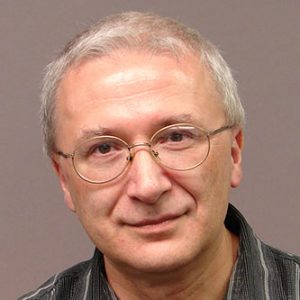Faculty

Sep. 2, 2019
Gary A. Weisman
Nucleotide receptors (P2 receptors) are present in nearly all cells and tissues where they mediate diverse functions including the regulation of platelet aggregation, muscle contraction, neurotransmission, insulin secretion, epithelial ion transport, wound healing and cell growth. We have isolated the first human P2 receptor gene and expressed it in mammalian cell lines that normally lack this receptor. These expression systems have enabled us to identify and purify the P2 receptor protein and current research is directed towards investigating structural features of the receptor that affect its functions. We have cloned or obtained 11 different P2 receptor subtypes belonging to 2…

Sep. 2, 2019
Thomas P. Mawhinney
Research in our laboratories focuses on a number of interrelated topics. In the area of exocrine defense mechanisms, with special emphasis on chronic obstructive pulmonary diseases in man, a sizable effort has been trained on developing a better understanding of mucous glycoproteins as a primary and secondary macromolecular defense response against lung pathogens and irritants. Structural elucidation is yielding significant insight into altered post-translational modifications of the side chain oligosaccharides from these molecules. With structural elucidation of respiratory mucins via classical chemical methodology and techniques involving lectins, 500 MHZ 1H-NMR and 13C-NMR, and fast-atom bombardment mass spectrometry (FAB-MS), we have…

Sep. 2, 2019
Ritcha Mehra-Chaudhary
Chaudhary obtained her M.Sc. and Ph.D. degree in plant physiology from Indian Agricultural Research Institute, New Delhi, India. After moving to the U.S., she trained as a post-doctoral fellow at the University of Tennessee, Memphis and worked on transcriptional regulation and proteomics of murine muscle cell differentiation. Later on, she trained in the field of protein structural biology (X-ray crystallography) and worked as a senior research specialist for eight years at the Structural Biology Core facility at the University of Missouri, Columbia. She is currently involved in undergraduate education and work as an assistant professor of teaching at the Department…

Sep. 2, 2019
Valeri Mossine
Educational background Ph.D. Bioinorganic Chemistry, Academy of Science of Ukraine M.S. Analytic Chemistry, Kiev State University B.S. Chemistry and Math, Kiev State University…

Sep. 2, 2019
Thomas J. Reilly, PhD
Educational background Ph.D. Veterinary Pathobiology, University of Illinois Urbana-Champaign B.S. Microbiology, University of Illinois Urbana-Champaign…

Sep. 2, 2019
Michael J. Petris
The micronutrient copper (Cu) is essential for several key enzymatic processes involved in energy generation, protection against reactive oxygen species, formation of blood vessels, immune function, and healthy functioning of the central nervous system. This nutrient is able to exist in two oxidation states Cu1+ and Cu2+, and participate in the generation of reactive oxygen species. A delicate balance of copper homeostasis must be maintained to provide sufficient levels of this nutrient, while preventing toxic build up. Copper and Cancer Recent evidence suggests that copper plays a key role in tumor growth because this metal is essential for blood…

Sep. 2, 2019
Brian Mooney
I am particularly interested in protocol and technology development for proteomics and mass spectrometry. We use mass spectrometry for protein identification, protein/peptide quantitation, and mapping sites of post-translational modifications and protein-protein interactions. Metastable Crystallins: Structure and stabilization (NEI-NIH award R01EY023219) Cataract and a host of other diseases result from abnormal interaction of proteins in the cells. The goals of this research are to understand lens protein aggregation in cataract formation and to develop and test lens protein alpha-crystallin-derived peptide as active mini-chaperones capable of suppressing protein aggregation. Understanding the structural changes in mutant proteins associated with cataract can help…

Sep. 2, 2019
Xiaoqin Zou
The molecular interactions that drive ligand-protein binding are a key to quantitatively understanding the basis of molecular recognition and to designing therapeutic interventions through rational drug design. Drug molecules usually act by binding to specific target proteins. Drug candidates that have high binding affinities can be identified by their geometric and chemical complementarity to the target in a process analogous to solving a “jigsaw puzzle”, if the target structure is known. An energy model that can give rapid and accurate evaluation of the molecular interaction strength is thus essential for selecting plausible candidate compounds from a chemical database consisting of…

July 16, 2019
Mallory Lynn Rahe
Mallory Rahe is an associate extension professor at the University of Missouri. She approaches her work in the area of regional and agricultural economic development with an emphasis on assisting producers or stakeholders that are engaging in on-farm investments or considering public investment options. She provides applied research, data analysis and trends, and supports strategic decision making. She has worked on a variety of value-added industry studies, studied farmers market vendor sales and retention, rural population migration and retention, and implemented a regional rural wealth creation program. Her research is often undertaken collaboratively with partner organizations. Educational background Ph.D. University…

July 16, 2019
Samniqueka Joi-Weaver Halsey
Educational background Ph.D., University of Illinois-Urbana Champaign, 2019 MBA, University of Illinois-Urbana Champaign, 2020 M.S., Chicago State University, 2013 B.S., Northeastern Illinois University, 2011 Courses taught F_W 4600WI/7600: Ecosystem Management NAT_R 4110/7110: Natural Resource Biometrics F_W 4810: Wildlife Disease Ecology NAT_R 8200: Ecological Restoration…